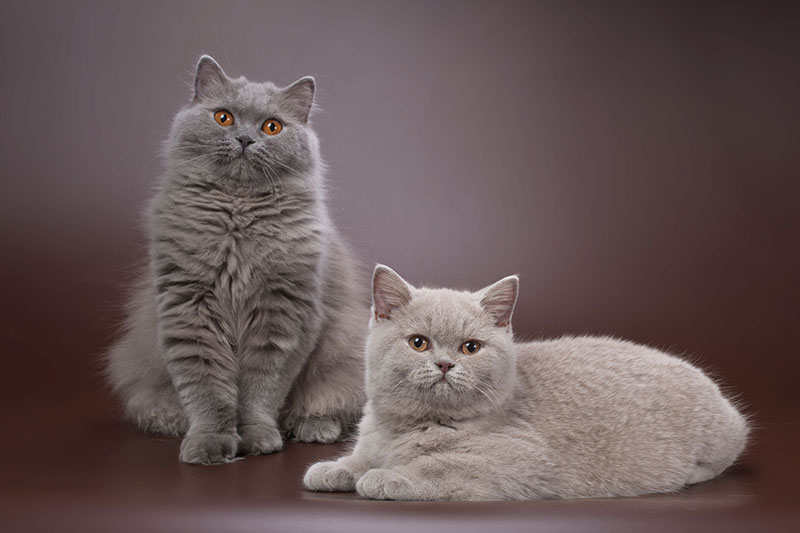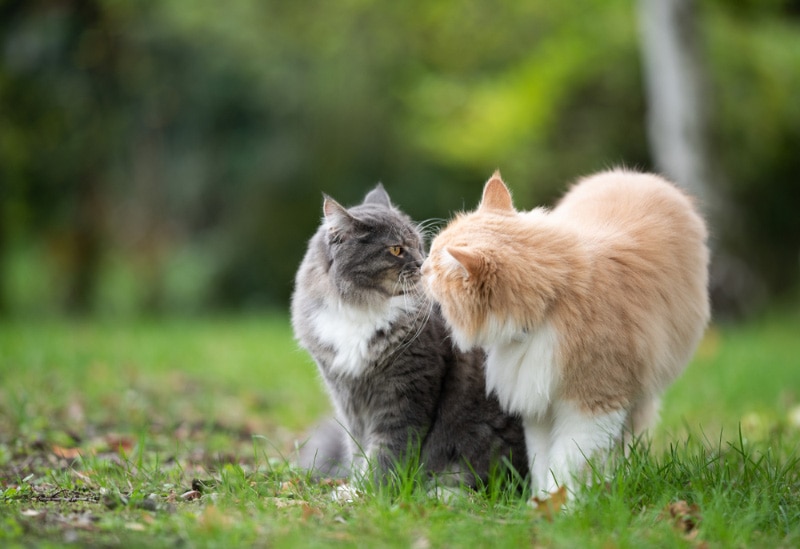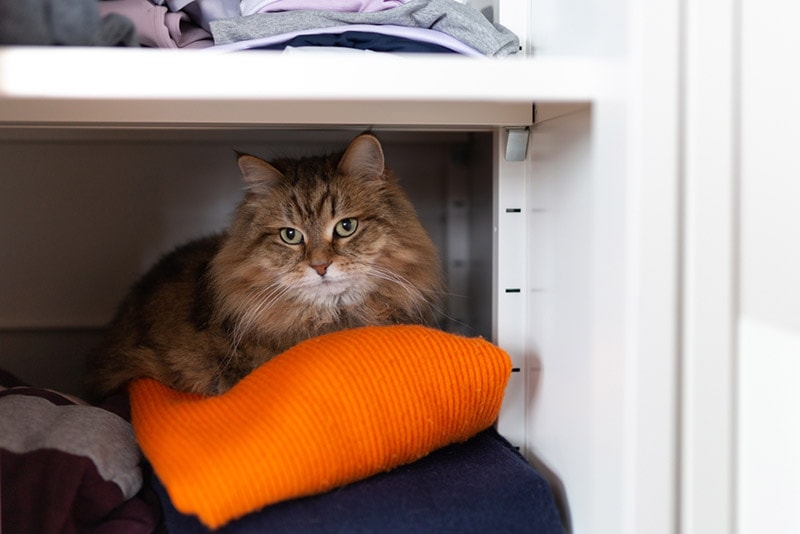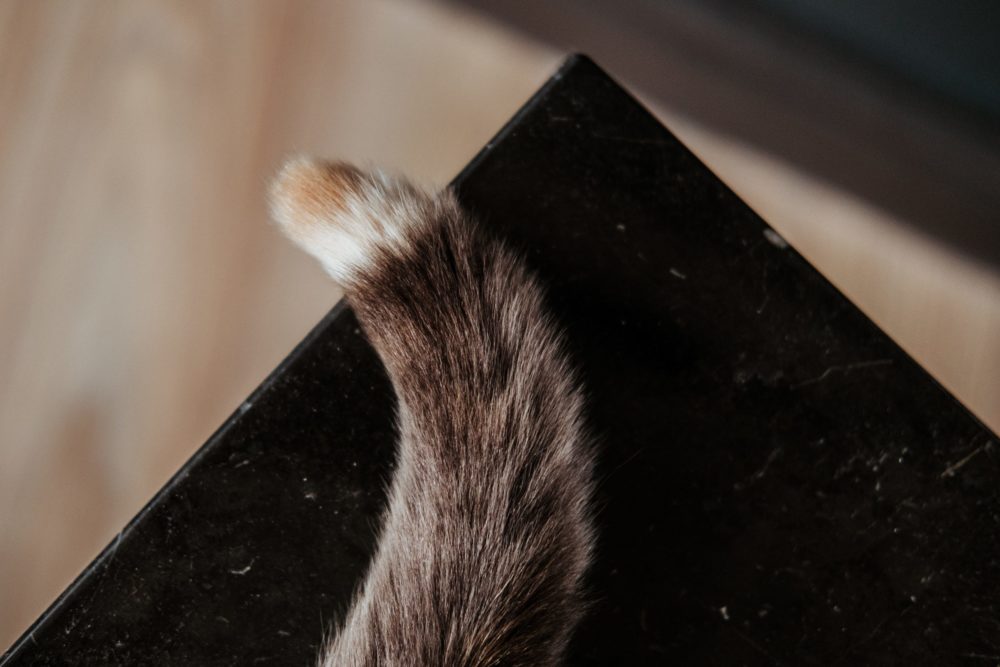Do Cats Inbreed? Risks & FAQ
Updated on

Click to Skip Ahead
Inbreeding is the mating of closely related cats to one another. Humans have realized over the millennia that this practice can result in undesirable birth defects. Despite this practice historically being carried out by some cultures in olden times, today, merely the thought of it evokes a cringe. It is generally viewed as immoral and is vehemently avoided.
Cats, however, have no such qualms. From a purely biological perspective, their primary purpose is to survive long enough to continue their lineage through reproduction, and an intact cat will unerringly seek to fulfill this purpose. To them, the choice of mate is inconsequential in the achievement of their goal. So, given the opportunity and under the right circumstances, cats will readily inbreed.
Is It Natural for Cats to Inbreed?
In the wild, cats and most other animals will inbreed if necessary. It is noteworthy, however, that most wild animals have an inherent urge to avoid inbreeding if possible 1. In other words, the latter is instinctively preferable if there is a choice between a close family member and a non-related individual. But inbreeding certainly occurs as a matter of course in many wild and feral cat populations.
It is puzzling that there aren’t more visible and detrimental genetic disabilities prevalent in these populations. A suggested reason for this is that wild inbred individuals who inherit defective genes can overcome or adapt to the defect before it is expressed on a physical or phenotypic level 2. It would appear that domestic or captive animals cannot adapt similarly, and thus the effects of inbreeding will sooner be discernible.

The 4 Reasons Why Cats Inbreed
While there may be an automatic inclination to avoid mating with their close family members, it is not always heeded, particularly in domestic or urban environments. Cats will readily mate with a parent or sibling, and here’s why:
1. There Are No Other Mates Available
Cats living in isolated areas with little or no access to other populations will naturally inbreed to continue reproducing. They are simply following their instincts and making do under the circumstances.
2. Cats Don’t Have the Same Understanding or a Close Relative That Humans Do
Cats do not seem to recognize familial bonds in the same way that humans do. It is often observed that parents and their offspring and sibling cats seem to share a special bond. However, this bond does not prevent these closely related kitties from reproducing with one another. Considering their hard-wired primary biological instinct to procreate, the relationship is irrelevant.

3. They Don’t Comprehend the Risks Involved with Inbreeding
Cats have no comprehension of the dangers involved with inbreeding. Cats do not view defects of any kind in the same way that they are by humans. There is certainly no understanding of the concept of cause and effect, and there’s no way that they could ever realize that mating with their close family member resulted in a particular defect in their offspring.
4. They Are Not Spayed or Neutered
This final reason that cats inbreed falls completely within the realm of human responsibility. No genetically defective kitten should ever have to be born if unplanned inbreeding didn’t take place. Cats in heat are highly effective at finding a mate and vice versa. The best way to ensure the prevention of unplanned litters is to spay and neuter cats that will not or should not be used for breeding. Kittens should be spayed or neutered before they reach 6 months of age.
Inbreeding Concerns
There are many harmful effects of inbreeding. Genetic issues and diseases are often particular to specific breeds resulting from selective breeding. Some defects are consciously selected for when breeding as they are considered cute or attractive, such as the folded ears of the Scottish Fold, the flat face of the Persian, or the hairlessness of the Sphynx.
Disease
While some of these phenotypes may be relatively harmless (some are not), they may be accompanied by a higher prevalence of other genetic diseases, such as polycystic kidney disease, deafness, hypertrophic cardiomyopathy, and progressive retinal atrophy, to name just a few.

Stillborn Kittens
Inbreeding can also result in small litters or stillborn kittens. This is Nature’s way of protecting the gene pool by ensuring that weak individuals don’t survive to reproduce. It is one of the signs of inbreeding depression. Individuals who survive may become infertile, have a generally weak immune system, and be more susceptible to infections.
Fortunately, this is not always the case. If close relatives breed and there isn’t a history of inbreeding in the lineage already, there’s a good chance that there will be no noticeable ill effects in the offspring. The more instances of inbreeding that are present in a particular lineage, the greater the chances of genetic disorders occurring.
What Is Selective Breeding?
To a greater or lesser extent, selective breeding is inbreeding. With selective breeding, parents that exhibit preferred similar traits are bred to one another to express the trait with every subsequent breeding event. This practice does not improve genetic diversity, which is scientifically accepted to improve and strengthen a species.
When cats are selectively bred, the parents are often closely related or at least from similar bloodlines. Even when they are not, selecting specific traits in such a way means that much of their DNA is similar anyway.
Selective breeding is carried out to establish a specific pedigreed breed of cat with fixed traits and characteristics. Unfortunately, pedigreed cats are generally more prone to the development of genetic diseases due to inbreeding events in their lineage.
Should Inbreeding Be Avoided?
Overall, any suggested benefits of inbreeding, whether intentional or not, are far outweighed by the ill effects. Although inbreeding, via selective breeding and line breeding programs, is carried out under strictly supervised conditions, allowing it to occur under any other circumstances is not advisable. One could even question whether it is ethical for selective inbreeding or line breeding to take place as they result in conditions that negatively affect the offspring.
In general, considering that breeding should result in strong and viable individuals, inbreeding should always be avoided.
Conclusion
Although it’s natural for cats to inbreed, it shouldn’t be encouraged. Domestic and feral cats don’t live under “natural” conditions anymore. Humans have interfered with cats’ environments and existence. To ensure their continued health and general well-being as a species, we must continue to do so. Keeping intact animals apart or preferably sterilizing cats of breeding age should be implemented, with a preference for the latter.
Featured Image Credit: OksanaSusoeva, Shutterstock












